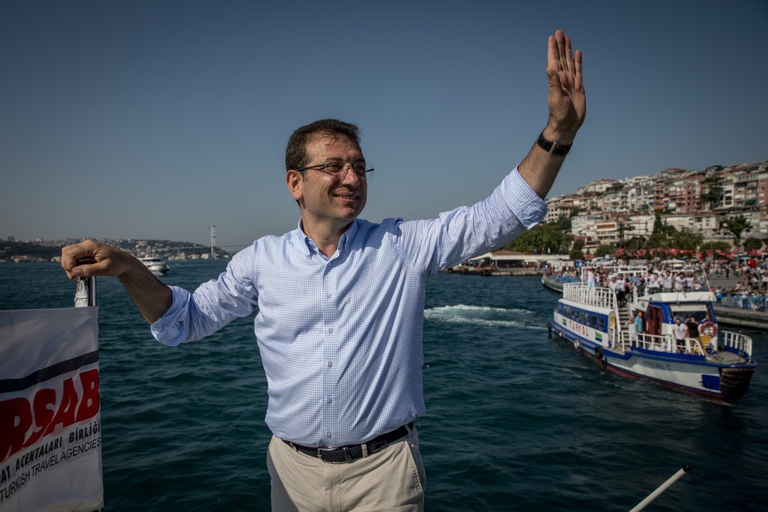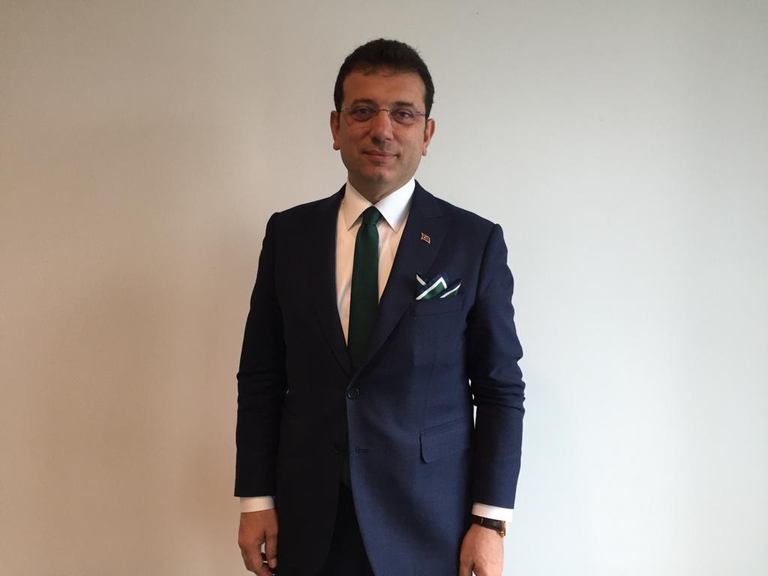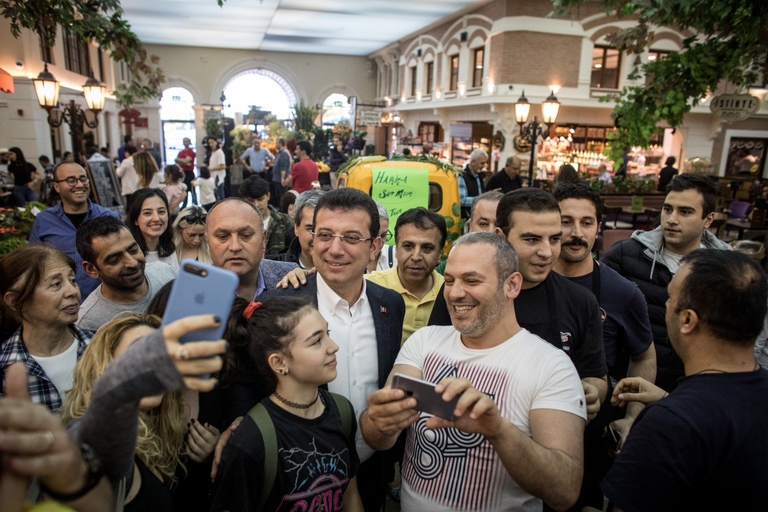
From Nepal to Morocco, from Madagascar to Peru, many antigovernamental protests that took place these weeks were led by Gen Z protesters.
“Local leaders have to ensure that changes happen. Every action a city takes for climate has an impact on the whole world”. We interviewed Ekrem İmamoğlu, Mayor of Istanbul, about mayors’ key role in tackling the global climate crisis.
“He represents all the things that have been missing for a long time”. This is how a Turkish civil society activist describes Ekrem İmamoğlu, the new mayor of Istanbul. These words probably resonate with millions of citizens who, for the first time in a quarter of a century, witnessed a step towards a more democratic and inclusive country.
İmamoğlu ran in opposition to the conservative Justice and Development Party (AKP) – the one led by President Recep Tayyip Erdoğan. The mayoral candidate, a newcomer to the political scene, won the elections in March with a clear margin, but his victory was annulled. However, in the second round of voting, İmamoğlu’s triumph left no room for doubt.
Even though he’s already won what many thought was an impossible race, İmamoğlu is convinced that the challenges are just beginning. He presented his plan to create a greener, more inclusive and more resilient Istanbul at the C40 World Mayors Summit held in Copenhagen, Denmark, from 9 to 12 October, where mayors from cities committed to fighting against the climate crisis all over the world met to discuss the necessary steps for the future.
On this occasion, İmamoğlu co-signed the Deadline 2020 Pledge, a commitment to enact climate plans to ensure the objectives set out in the Paris Agreement are achieved. We spoke to the mayor in Copenhagen, and asked him about his experience, ideas and expectations around the ongoing climate crisis, and cities’ importance on the global stage.
In what way has the city of Istanbul been affected by the climate crisis, and what is it doing to combat it?
Much like the rest of the world, Istanbul has suffered the effects of climate change. Unprecedented levels of rainfall and flooding have been recorded, as well as lengthy periods of drought. These happen both in winter and summer, affecting the natural environment as well as agricultural activities around the city. Even though we’re a new administration, we’re already focusing on these issues. What we need to do now is take a snapshot of Istanbul to gather all the data we need, such as CO2 emissions levels. This will establish a starting point which will be used to compare what we’ll achieve over the next five years. And we’ll share this information with the world.
How important are cities in terms of environmental policies at the national level? Can they push governments to act?
Istanbul has a population of 16 million people. Whatever is done there has a big impact on national politics. If good practices are developed in Istanbul, the rest of Turkey will accept them and adapt. We’ll use this influence on Turkey to take steps forwards with regards to the climate crisis. Our expertise isn’t just for our city, but for all of Turkey and humanity. Therefore, yes, I do expect that our policies will profoundly influence national politics.
We talked about bold actions for an inclusive future with @AdaColau, Mayor of #Barcelona, and @mayorcantrell, Mayor of New Orleans. In our cities, we must ensure the integration of every citizen through permanent social mechanisms that will not require bold actions or heroes. pic.twitter.com/25jTcFbShs
— Ekrem İmamoğlu (International) (@imamoglu_int) October 11, 2019
The climate movement has been growing all over the world, especially among young people. How have you seen it grow in your city?
There are several groups of activists in Istanbul. There are people of all ages, but I’m most enthusiastic about young people and their courage. They’re conscientous, well-informed and sensible. It’s likely that if the world was made up just of this generation, it would quickly take serious action against climate change.
How is this movement perceived by citizens?
There’s definitely a part of society that doesn’t understand it and doesn’t want it to be prioritised. But I believe that if we try to explain it in the best way possible, the majority of people would be willing to understand and take action. Therefore, I don’t see it as a clash between citizens, but as an opportunity for integration.
And what about institutions?
To be honest, I don’t think it’s going to be easy. It’s going to take time. Many people, businesses and institutions have old habits that will be hard to let go of. In many countries there is the belief that the costs of making changes are a waste, and this could be discouraging, initially. But this is exactly where people like me, local leaders, can take responsibility to ensure that these changes come about. From my perspective, I can say that I’ll manage this process and motivate people. It’ll just take time.
Which aspects would you like to focus on from the very start?
I want to highlight the fact that Istanbul suffers from bad urbanisation, and this is having a negative effect on its inhabitants. Citizens are being separated from natural environments, especially in certain areas. My priority is to turn this problem into something positive. We believe that by defining a coherent vision of our city’s future, everything is possible. One of the most important factors in determining how the city will be more just, green and creative is taking the effects of climate change into account. In particular, we’re working to increase green spaces, which have been reduced across the city. Our plan is to create 30 million square metres of usable green areas in the next five years. And we’re also increasing investments in clean and renewable energy thanks to a series of projects.
You were able to win over the city at a time when being part of the opposition is extremely difficult. You ran twice, and won both times. What do you think this means for the country’s future?
The answer to this lies precisely in my experience. It shows me that you must never sever the dialogue and ties with your people. That you should always communicate with people. That actions and policies must always be explained clearly and transparently. That we must take responsibility and always answer questions. If the ties are kept strong, and a feeling of tolerance is built – a key factor in Istanbul – then all problems can be solved. Because you start seeing people not as opposition, but as fellow citizens.
Siamo anche su WhatsApp. Segui il canale ufficiale LifeGate per restare aggiornata, aggiornato sulle ultime notizie e sulle nostre attività.
![]()
Quest'opera è distribuita con Licenza Creative Commons Attribuzione - Non commerciale - Non opere derivate 4.0 Internazionale.
From Nepal to Morocco, from Madagascar to Peru, many antigovernamental protests that took place these weeks were led by Gen Z protesters.
Joe Biden breaks ahead. Sanders falls but stays in the race. Bloomberg is hanging by a thread. Warren is invisible. The final results of Super Tuesday, a key day in the Democratic primaries to choose the candidate for the the US presidential elections.
Il giudice Steven Reed è diventato sindaco della città del profondo Sud, culla del movimento per i diritti civili.
A successful day for Greens and nationalists, while traditional parties suffer. The outcome? A European Parliament divided into homogeneous “slices”. The final results of the European elections 2019.
From 23 to 26 May voting will take place in the European Elections 2019. Who can vote, who the candidates are and how to vote to elect the 751 representatives at the European Parliament in Strasbourg.
After a series of diplomatic assignments, including with the United Nations, Sahle-Work Zewde has become the first female president of Ethiopia.
The House goes to the Democrats, the Senate remains Republican. But the midterm election results are positive especially for women. How the vote for Congress and 36 governors went.
In the midterm elections of the 6th of November, in 36 out of 50 United States a new governor was chosen on top the members of Congress. Here are all the results of the gubernatorial races.
The results of the midterm elections 2018 in the United States: the Democrats win the majority of seats in the House of Representatives, whilst the Senate remains in Republican hands. Follow the results live.










